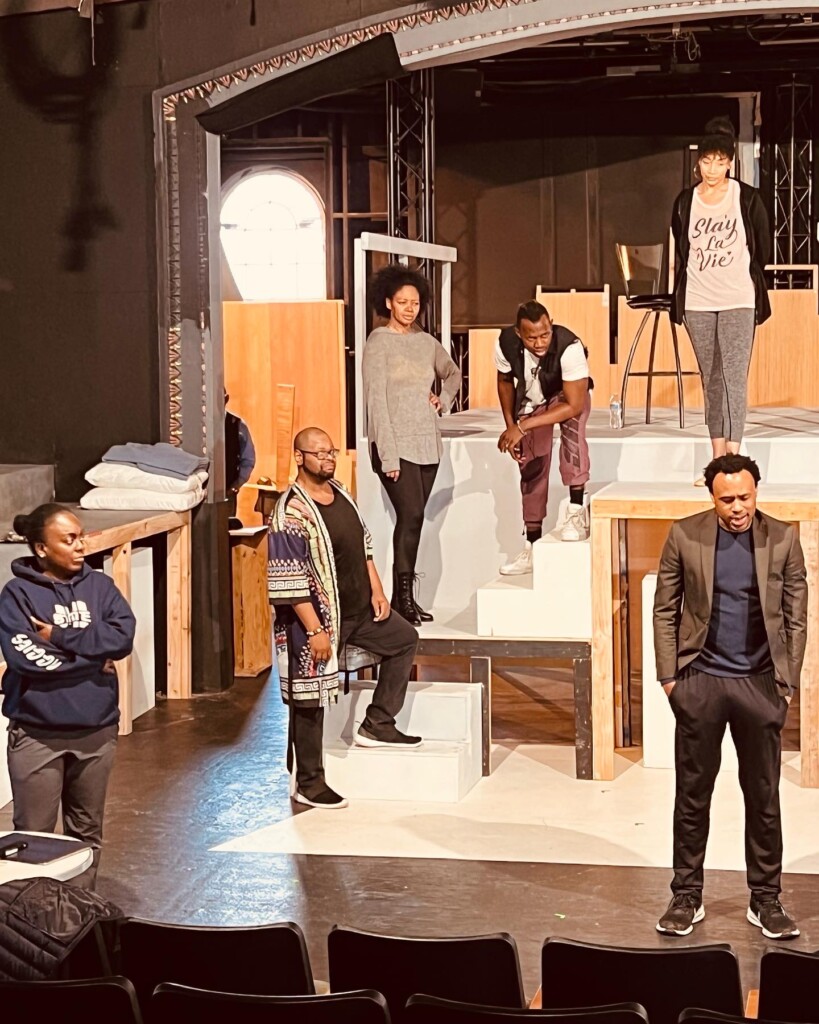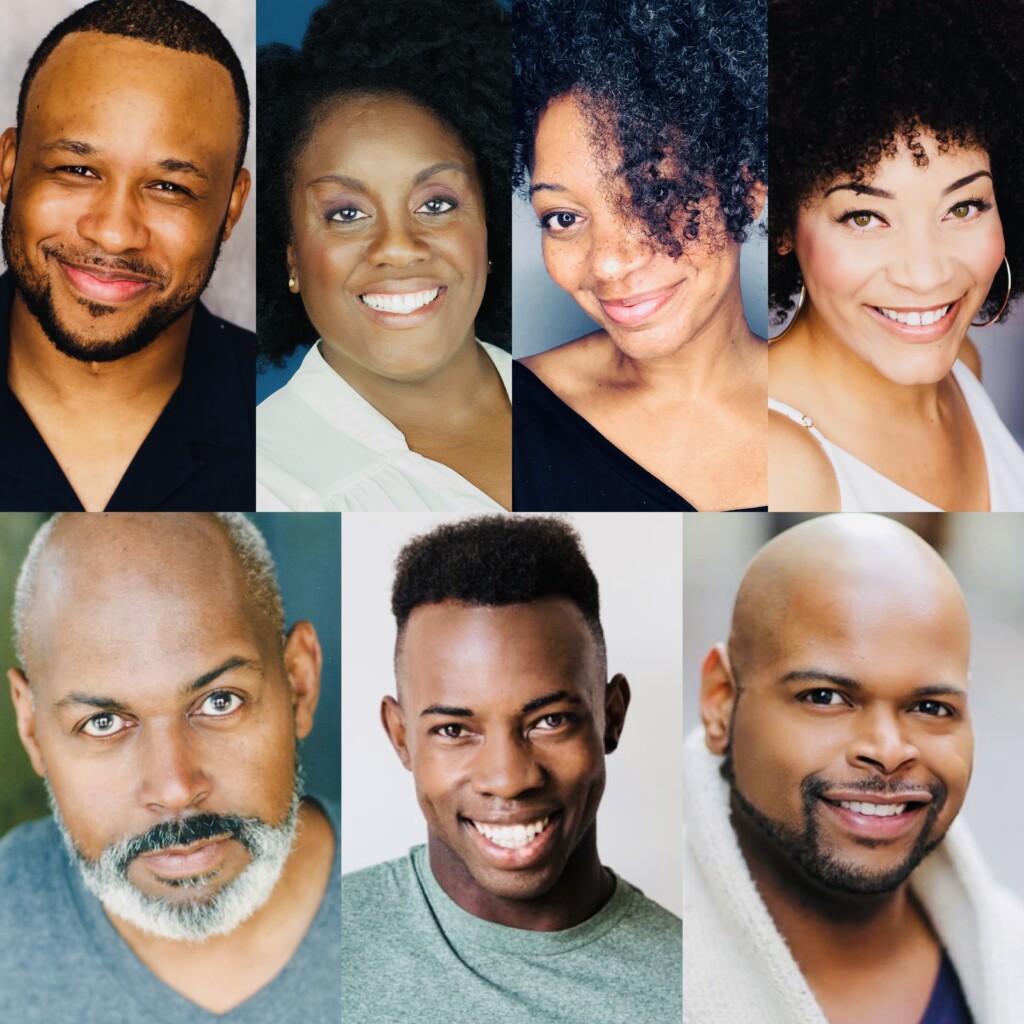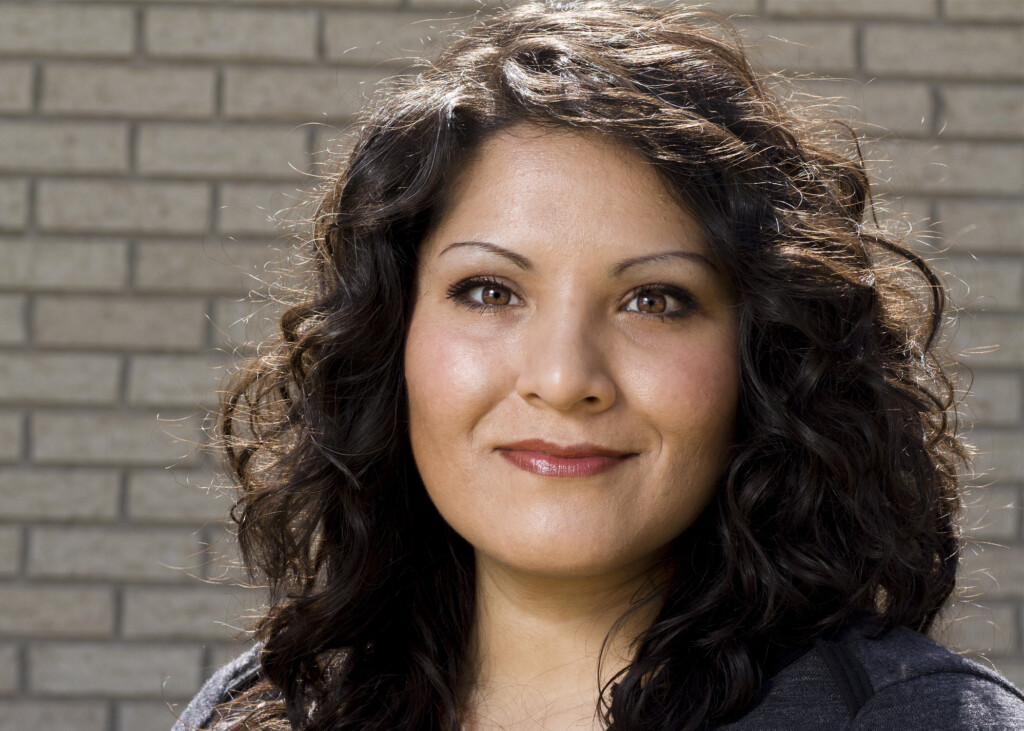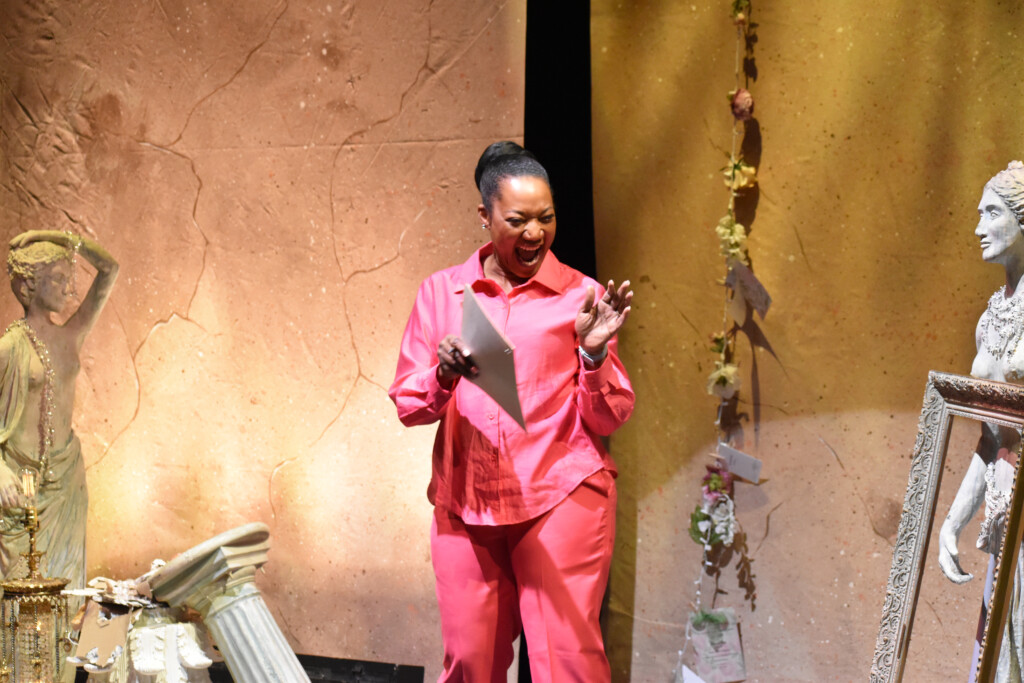Early April brings new productions to Salt Lake City’s independent theater scene, including the Utah premiere of the award-winning musical Passing Strange at the Salt Lake Acting Company (SLAC) and the world premiere of Plan-B Theatre’s production of Iris Salazar’s Aftershock.
PLAN-B THEATRE: AFTERSHOCK
Prior to the COVID-19 pandemic and the March 2020 earthquake that shocked an already anxious populace in Salt Lake City, playwright Iris Salazar had already been thinking about writing a work about the experiences of single women who are members of The Church of Jesus Christ of Latter-day Saints. She had written Single Sisters Society about LDS women who had started a matchmaking service, which she described as “silly and lighthearted.” Salazar, in a response to questions emailed by The Utah Review, explains, “I knew it was missing something and that was confirmed when I heard it read out loud at our Theatre Artists of Color Writing Workshop [a regular program for creative development offered by Plan-B Theatre]. In fact one of the workshop members called it cute and that was enough for me to just tuck it away. I was a little disappointed, but I didn’t think about it for a while.”
That was well before the pandemic and the earthquake but in 2020, Salazar, who is an active member in the LDS community, noticed social media posts from both members of the church as well as others who were struggling with loneliness and isolation, as the world ground to a halt that spring. “I knew right away that I needed to write about this from an LDS singles perspective,” Salazar notes. “I didn’t find myself in the same situation in regards to the feeling of loneliness and isolation like several of my friends were expressing. I really had to pay attention to what was being posted, and I felt that whatever I ended up writing needed to be treated with respect and honesty.”
From that vantage, Salazar wrote Aftershock, featuring Teah – a single, non-conservative, full-figured, Morena Mormon Mexican, who also happens to be a virgin. Oh, and what appears initially as a visit to her therapist’s office turns out to be her audition for a reality dating show. Plan-B Theatre will stage the play’s world premiere in a run, beginning April 7 and continuing through April 17 in the Studio Theatre of the Rose Wagner Center for Performing Arts.
The cast features Estephani Cerros, a recent Weber State University graduate, as Teah, her debut performance with Plan-B Theatre. Yolanda Stange returns to the Plan-B stage, this time as Dr. Love Dearest. Rounding out the ensemble are Danny Borba, Pedro Flores, Liza Shoell and Sam Torres. Cheryl Ann Cluff is production director and sound designer.
Throughout the years, Plan-B Theatre has produced quite a list of outstanding original works by Utah playwrights, which offer sharp, constructively critical yet dignified, enlightening perspectives on LDS identity, faith, membership and sociocultural dynamics. Aftershock will certainly become a part of that worthy canon. “I had to look back at my own life and the 20+ years that I have spent attending LDS singles wards and dating in general,” Salazar writes. “I also needed to show the imperfections and experiences of college-aged individuals navigating through deconstructing and solidifying what one believes because anyone that came from a strict religious upbringing or just a strict upbringing knows that moving out of your home for the first time right out of high school will bring everything you believe in to question.”

And, in reading Salazar’s script, several observations emerge. So much of the play’s distinct culture for this place we call Utah rings very credibly and instantly, for audiences whether or not they are Mormon or from Utah or born elsewhere. There are themes of the obsession with the ideal and perfectionism, the quick urge for judgment, and the awkward fears of trying to establish a connection. “Simply put, I’ve lived these themes,” Salazar explains. Her upbringing in the church, however, was not traditional. “I was raised by a single LDS mother and although my dad was never an LDS member, he was a baptized Catholic. When my mother didn’t join us for church I would walk with my siblings to church where I knew my grandmother would be waiting for us. I had single and divorced teachers in my youth classes at church. We were a small youth group and sometimes the kids of an inactive member in the neighborhood would show up and participate in activities.”
Salazar, who was raised in Salt Lake City’s Liberty Park neighborhood, adds that her LDS experiences differed from those of friends from Park City or the Upper East side LDS wards of the city. “I did see the obsession of perfectionism amongst my peers,” she notes. “I experienced judgment from neighbors who had no idea I was Mormon and judged me by the color of my skin. I personally didn’t have difficulty establishing connections with people but it doesn’t come easy for many. This all applies to anyone, not just religious people.”
And, as any Utahn can attest to, regardless of their identity of faith, is that the dynamics do tend to swing abruptly toward extreme responses or reactions. “The judgment and the lack of connection between religious and non-religious has always been very interesting to me,” Salazar says. “I have found myself in groups where people are quick to make judgmental comments or cynical remarks about LDS members. I listen and usually jump in with my two cents revealing that I am LDS and they may not say anything in response; sometimes they apologize and other times they just seem surprised that I am such an ‘open minded’ LDS member. Occasionally I find myself in groups of LDS members who make ignorant or nonsensical comments about non-LDS people but honestly in my experience it is mostly the non-LDS or former LDS members dishing out the judgmental commentary.”
These dynamics crystallized Salazar’s creative intentions for Aftershock, which is far, far away from the original cute vibe of Single Sisters Society. “I wanted people to see that a celibate person, is not sexually naive, that a plus-size single woman can be confident, that having a religious upbringing doesn’t mean you haven’t experienced life or questioned your beliefs,” she notes. Salazar adds, “writing it was a bold, blunt and vulnerable work for me.”
Salazar’s script also throws open the windows on a discussion that could be had honestly without resorting to reflexive judgments. In Utah, it does seem like the wilderness for many exists — especially if they do not fit the conventional descriptions of a traditional couple finding love and settling down. There is so much tentativeness and if one doesn’t fit the ideal model of conventional society in Utah, then how does one go about navigating the mystery and ambiguity around the issue of intimacy? Is there a good way to navigate through this wilderness of ambiguity and perhaps finally find love, regardless of one’s age or identity, in Utah?
Salazar’s response underscores the desirability yet befuddling complexities involved. “If anyone figures this one out please, write a manual,” she says. “I have had a few people in my life say that if I ‘get out of Utah’ I will have men lined up to date me. I barely date so I may not have the best response to this question.”
She adds that on dates with LDS men, she is aware that she is being sized up for her merits as an “eternal companion.” She says that the anxiety and pressure are real, as she tries to backtrack and seek out clues for why he decided to ask her out on a date. And, she says that there was the man who thought he could persuade her to go home with him after just one date. “We all know that there are several types of intimacy levels/types that we experience and for anyone practicing celibacy it is going to be very important to explore all those other types of intimacy before they experience sexual intimacy, which for most religious celibate individuals will not happen until marriage,” Salazar explains. “I also know non-celibate people who are more casual about their sexual intimacy and may experience it before they have explored other types of intimacy in their relationships. In my opinion, navigating a relationship and finding love is a very personal and individual thing.”
Aftershock does not promise a template nor a panacea but it makes the case for patience and willingness to take individual steps. “If you are not certain of your core beliefs, whether they are based on religious views or not, if you are not certain of what you stand for and if you don’t have a sense of who you are that is going hinder your relationships no matter where you live or go in life, regardless of what religious practices you have or not,” she explains. “When all is said and done there isn’t a perfect formula for finding love, it’s different for everyone. Each person you meet will bring something different to your relationship and you have to work at it together to make it work for the both of you.”
Performances will run Thursdays, Fridays and Saturdays at 8 p.m., along with matinees at 4 p.m. on Saturdays and 2 p.m. on Sundays. The production also will be available for streaming video on demand April 13-17. For more information about ticketing, streaming and COVID-19 safety policies, see the Plan-B Theatre website.
SALT LAKE ACTING COMPANY: PASSING STRANGE
When author Ta-Nehisi Coates went to Paris from his native Baltimore, he wrote about the experiences of trying to sort out the train schedule in Geneva which would take him to France. “It occurred to me that I really was in someone else’s country and yet, in some necessary way, I was outside of their country,” he wrote in his 2015 autobiographical book, Between Me and the World. “In America I was part of an equation–even if it wasn’t a part I relished….But sitting in that garden, for the first time I was an alien, I was a sailor–landless and disconnected. And I was sorry that I had never felt this particular loneliness before–that I had never felt myself so far outside of someone else’s dream.”
In the 2008 musical Passing Strange by Stew, Heidi Rodewald, and Annie Dorsen, the principal identity at the heart of the story is Youth, who embarks on a somewhat similar yet equally consequential journey to that which Coates took and recalled the details in his own book. More specifically, Passing Strange is the rendering of the life details of Mark Stewart (Stew), who, from the ages of 14 to 22, transforms from a teen with bohemian dreams in south central Los Angeles to a young musician who has experienced life in Amsterdam and Berlin. Along the way, he absorbs the muses of James Baldwin and Josephine Baker, for example, and he engages artistically, socially and politically with performance artists, punk rock musicians and the cultural essence of the New Wave in France. When the musical hit Broadway nearly 15 years ago, National Public Radio’s David Bianculli noted that “Passing Strange was written and performed by indie-rock musician Stew, whose real name is Mark Stewart. With his band, The Negro Problem, the self-proclaimed ‘rock ‘n’ roll lifer’ has toured around the world, putting out albums of what he calls ‘Afro-Baroque cabaret’ music.” From Stew’s interview with NPR in 2008: “It’s what I like to call autobiographical fiction, in that every single thing that’s happening on the stage, I can point to something in my life, some kind of corollary, you know, that corresponds in some way.”

Stew’s story as rendered in the musical has aged very well. The long anticipated Utah premiere of Passing Strange comes this week to a new production at the Salt Lake Acting Company – a hallmark moment for the company’s golden anniversary season. The production will run April 6 to May 15.
“The show celebrates Blackness, what it is and how it can look different for every individual,” Todd Underwood, director of the production, says in an interview with The Utah Review. “It is for the individual to become comfortable in their Blackness and the story really resonates for finding the peace and love that comes in being fully within their Blackness.”
While the show is receiving its Utah premiere, its genesis nearly 20 years ago came at the Sundance Institute Theatre Labs in Park City during 2004 and 2005, which received two rounds of creative development — a decision that happens rarely for projects being workshopped here. Passing Strange received its world premiere in Berkeley, California and was later staged Off-Broadway before having its Broadway premiere in 2008. Filmmaker Spike Lee produced and directed a filmed version of the musical, which premiered at Sundance in 2009.

While the musical’s Broadway run only lasted 165 performances, it earned numerous awards, including the Tony Award for Best Book, as well as eight Drama Desk Awards including best musical, best lyrics and best music, and an Obie Award. Passing Strange became Lee’s first film to premiere at Sundance, and it later earned rave reviews when it screened at the Tribeca Film Festival in 2009. It aired in 2010 on PBS’ Great Performances.
One of its most enthusiastic appraisals came from Charles Isherwood’s review at The New York Times, upon its Broadway premiere. “But please don’t call it a Broadway musical. You could scare away too many people who might actually enjoy it,” he wrote. “Call it a rock concert with a story to tell, trimmed with a lot of great jokes. Or call it a sprawling work of performance art, complete with angry rants and scary drag queens. Call it whatever you want, really. I’ll just call it wonderful, and a welcome anomaly on Broadway, which can use all the vigorous new artistic blood it can get.” It is with that same spirit that is at the core of SLAC’s decision, which has been percolating for some time, to have the ideal moment for staging the Utah premiere of this show.
In 2022, the show’s elements seem eternally ripened, which makes this staging especially well-timed. Underwood, an internationally recognized director and choreographer with a long portfolio of credits in stage and film, is the associate artistic producer at Ivoryton Playhouse in Connecticut. He says that working with the cast, crew and musicians for the new SLAC production is “truly bountiful.” He adds that the cast “inspires me as I am in awe of them and their willingness to be both vulnerable and transparent. They have joyfully invested themselves in the piece, asking deep and probing questions. A true family has been born with this show and it is showing up on stage in the most wonderful way.”
The cast for the production is a veritable dream team of performers, representing not only company veterans but newcomers as well. Carleton Bluford, who has appeared previously in two SLAC productions and whose own play The Clean-Up Project premiered in an unforgettable blockbuster production earlier this year at Plan-B Theatre, will take on the principal role of Youth, the bohemian artist. Two other SLAC veterans – definitely among the finest actors who have ever graced the stages of Salt Lake City-based productions – also will appear: Latoya Cameron joining the ensemble and Dee-Dee Darby-Duffin as Mother. Cameron also is the dramaturg for the show.
The SLAC newcomers round out the distinguished ensemble. They include Lee Palmer (Jitney, Congo Square Theatre; Two Trains Running, Goodman Theatre) as narrator, as well as ensemble players Brian Kinnard (Broadway’s Rocktopia), Kandyce Marie (Aida International Broadway Tour), and Jamal A. Shuriah (FX’s Pose). Alex Marshall is musical director as well as keyboardist and guitarist. The onstage band also will comprise Andres Reyes (guitarist/keyboardist), Zaza Historia VanDyke (bassist) and Wachira Waigwastone (drummer).
Community partners for the production include Curly Me!, a nonprofit dedicated to events and mentor-based program for Black girls, ages 5-14, and the Utah Black Artists Collective (UBLAC), which promotes diversity in the arts by supporting Black artists, musicians, dancers, and creatives, also mentoring and encouraging youth to share their unique voices through creativity.
Performances will take place in SLAC’s Upstairs Theatre (168 West 500 North). For information about performances, tickets and other information including accessiblity, see the SLAC website or call 801-363-7522.





